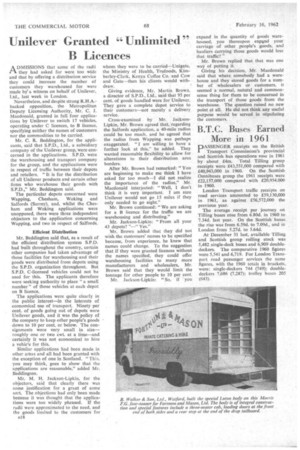Unilever Granted " Unlimited " B Licences
Page 24

If you've noticed an error in this article please click here to report it so we can fix it.
ADMISSIONS that some of the radii they had asked for were too wide and that by offering a distribution service they could increase the number of customers they warehoused for were made bi a witness on behalf of Unilever, Ltd., last week in London.
Nevertheless, and despite strong R.H.A.backed opposition, the Metropolitan Deputy Licensing Authority, Mr. C. J. Macdonald, granted in full four applications by Unilever to switch 17 vehicles, operating under C licences, to B licence, specifying neither the names of customers nor the commodities to be carried.
Mr. C. R. Beddington, for the applicants, said that S.P.D., Ltd., a subsidiary company of the Unilever group, were concerned in the applications. S.P.D. were the warehousing and transport company for the group, and the applications were in respect of traffic between their depots and retailers. "It is for the distribution of all Unilever products and certain other firms who warehouse their goods with S.P.D.," Mr. Beddington said.
The particular depots concerned were Wapping, Chesham, Woking and Salfords (Surrey), and, whilst the Chesham and Woking applications were unopposed, there were three independent objectors to the application concerning Wapping, and two in respect of Salfords.
Efficient Distribution Mr. Beddington said that, as a result of the efficient distribution system S.P.D. had built throughout the country, certain other companies had taken advantage of those facilities for warehousing and their goods were distributed from depots using the S.P.D. organization throughout. But S.P.D. C-licensed vehicles could not be used for this. The applicants therefore were seeking authority to place "a small number" of those vehicles at each depot on B licence.
The applications were quite clearly in the public interest—in the interests of economical use of transport. Ninety per cent, of goods going out of depots were Unilever goods, and it was the policy of the company to keep other people's goods down to 10 per cent, or below. The consignments were very small in size— roughly one or two cwt. at a time—and certainly it was not economical to hire a vehic'e for this.
Similar applications had been made in other areas and all had been granted with the exception of one in Scotland. "This, you may think, goes to show that the applications are reasonable," added Mr. Beddington.
Mr. M. H. Jackson-Lipkin, for the objectors, said that clearly there was some justification for a grant of some sort. The objections had only been made because it was thought that the applications were too widely phrased. If the radii were approximated to the need, and the goods limited to the customers for al8 whom they were to be carried—Unigate, the Ministry of Health, Trufoods, Kimberley-Clark, Kenya Coffee Co. and Cow and Gate—then his clients would withdraw.
Giving evidence, Mr. Martin Brown, a director of S.P.D., Ltd., Said that 95 per cent, of goods handled were for Unilever. They gave a complete depot service to their customers—not merely a delivery. service.
Cross-examined by Mr. JacksonLipkin, Mr. Brown agreed that, regarding the Salfords application, a 40-mile radius could be too much, and he agreed that the radius from Wapping was perhaps exaggerated. "I am willing to have a further look at this," he added. They wanted reasonable flexibility to allow for alterations to their distribution area borders.
After Mr. Brown had remarked: "You are beginning to make me think I have asked for too much—I did not realize the importance of the radius," Mr. Macdonald interjected: "Well, I don't think it is very important. I am sure Unilever would not go 15 miles if they only needed to go eight."
Mr. Brown continued: "We are asking for a B licence for the traffic we are warehousing and distributing."
Mr. Jackson-Lipkin: "From all your 43 depots? "—" Yes."
Mr. Brown added that they did not wish the customers' names to be specified because, from experience, he knew that names could change. To the suggestion that if they were granted licences without the names specified, they could offer warehousing facilities to many more manufacturers and wholesalers, Mr. Brown said that they would limit the tonnage for other people to 10 per cent.
Mr. Jackson-Lipkin: "So, if you expand in the quantity of goods warehoused, you thereupon expand your carriage of other people's goods, and hauliers carrying those goods would lose that traffic? "
Mr. Brown replied that that was one way of putting it.
Giving his decision, Mr. Macdonald said that where somebody had a warehouse and they stored goods for a number of wholesalers or customers, it seemed a normal, natural and commonsense thing for them to be concerned in the transport of those goods from the warehouse. The question raised no new point at all. He did not think any useful purpose would be served in stipulating the customers.












































































































